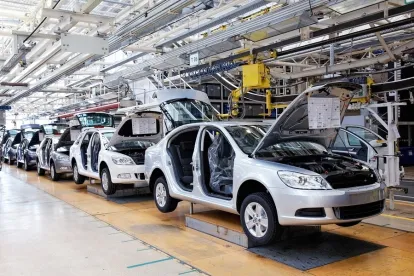This report helps automotive suppliers inform their legal and operational decisions to help address challenges and opportunities.
Key Developments
-
GM anticipates that none of its North American plants will have full shutdowns due to the chip shortage the week of November 1; however, some locations will still be operating with reduced shifts.
-
President Biden nominated Steven Cliff as administrator of the National Highway Traffic Safety Administration.Cliff has served as the agency’s deputy administrator since February 2021, and he previously was the deputy executive officer at the California Air Resources Board.
-
Stellantis and the National Business League launched the pilot phase of the National Black Supplier Development program, which will assist with contracting and procurement opportunities across numerous industries. The program was announced in June, and the pilot phase will run through the first quarter of 2022.
-
The Mexican Association of Automotive Distributors (AMDA) is concerned that new car sales in the nation could drop by as much as 30%, following efforts by the Mexican government to encourage the registration and legalization of used cars imported from the U.S.
-
China revealed new actions to control the nation’s power market, including increasing coal output and lowering prices, to mitigate recent power rationing and surging coal prices.
-
Electric vehicles and low emissions technology:
-
Stellantis and Samsung SDI have reached an agreement to jointly produce EV batteries in North America beginning in 2025. This represents the automaker’s second North American battery plant following the announcement of its joint venture with LG Energy Solution.
-
Tesla reported its third consecutive record quarterly profit, delivering 73% more vehicles in the third quarter compared to the same period one year ago.
-
Hertz placed an order for 100,000 Tesla Model 3 sedans to be delivered by the end of 2022.
-
The Canadian government warned that U.S. proposals to implement new EV tax credits for American-built vehicles would negatively impact the North American auto industry, and potentially violate trade agreements.
-
Electric vehicle expansion plans have recently been announced by smartphone maker Xiaomi, property developer Evergrande Group, and contract electronics manufacturer Foxconn.
-
Market Trends and Regulatory
-
In a recent letter, a bipartisan group of over three dozen U.S. House lawmakers urged leaders in Congress to advance legislation that would provide $52 billion in funding for domestic semiconductor capacity, including $2 billion set aside for “mature mode” chips used in the auto industry.
-
Companies, including Intel, General Motors, Infineon, and SK Hynix, have indicated they will cooperate with a Biden administration request to voluntarily disclose semiconductor supply chain information.
OEMs/Suppliers
-
Production impact of the semiconductor shortage –
-
GM is over halfway through the process of completing and shipping pickups that had been parked due to lack of chips.The automaker expects to complete its 2021 model years by the end of this calendar year, while 2022 model years will continue into next year.
-
Nissan will reduce global production by 30% through November due to the ongoing chip shortage.
-
Renault will reduce 2021 production by 500,000 units, which is more than double its previous forecast.
-
The debut of the Maserati Grecale SUV will be postponed until spring of 2022, from November 2021, due to parts shortages and supply chain constraints.
-
-
Magna reduced its 2021 sales guidance to a range of $35.4 billion to $36.4 billion, compared with a previous forecast of $38.0 billion to $39.5 billion. The supplier revised the forecast due to lowered global light vehicle production resulting from the impact of chip shortages and supply chain disruptions.
Connected/Autonomous Vehicles and Mobility Services
-
Truck fleet operator Ryder System Inc. and self-driving startup Gatik will partner to build a national U.S. autonomous short-haul, "middle-mile" logistics network to deliver goods to commercial customers.
-
Tesla pulled the latest version of its Full Self-Driving (FSD) beta software after users experienced issues such as false collision warnings.
Electric Vehicles and Low Emissions Technology
-
Tennessee will offer nearly $900 million in incentives to Ford to support the automaker’s plans to build electric F-series pickups at a new plant with SK Innovation.
-
New analysis from consultancy Anderson Economic Group states that “the direct monetary cost of fueling EVs is often higher than for comparable ICE vehicles.” The report also notes that the cost of electricity varies more widely than the cost of gasoline, and consumers in many locations face significant time burdens to charge EVs.
-
Ford indicated that some of its fleet customers are taking a “wait and see” approach to electric commercial vehicles, for reasons including lack of experience with EVs, and lack of clarity on government policy and regulation of EVs.
-
Tesla plans to begin using lithium iron phosphate (LFP) batteries in its standard-range vehicles, in response to constrained supplies and high costs for the nickel and cobalt in lithium ion batteries. Panasonic, which indicated it has no plans to develop LFP batteries, recently announced an advanced prototype battery with increased storage capacity that is intended to strengthen the company’s ties with Tesla.
-
China's Evergrande Group announced plans to make its electric vehicle venture its primary business within ten years. Evergrande has not yet delivered a single vehicle, and it recently avoided a default related to extensive liabilities in its core real estate operations.
-
Chinese smartphone maker Xiaomi intends to start mass-producing its own electric vehicles in 2024. Earlier this year the company announced plans to invest $10 billion in EV production over the next decade.
-
Foxconn intends to build electric vehicle manufacturing facilities in Europe, India and the Americas by 2024. Foxconn recently revealed its first electric concept vehicles, and it plans to build EVs for automotive customers, rather than selling them as Foxconn-branded vehicles.
Prepared by Julie Dautermann, Competitive Intelligence Analyst




 />i
/>i

